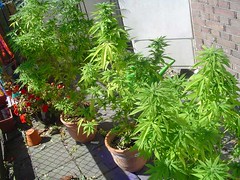Mayor Leers [of the Maastricth] has told the Dutch parliament that the licensing system that allows coffee shops to sell 5g of cannabis to each customer should be extended, to allow them to grow their own plants.
"They should have a permit to grow their own cannabis so that they can cut their ties with the criminals," the mayor says. "That way we can control things. At the moment our system is so hypocritical."
...[On the other side of the spectrum:]
Right-wing politicians in the Netherlands say that drugs tourism, and the contradictions this has revealed in the cannabis laws, show that liberalisation has had its day. They oppose the Maastricht mayor's call for coffee shops to be given growers' licences.
"That would only mean more drugs tourists and encourage the criminals," says Christian Democrat MP Cisca Joldersma.
She wants most of the coffee shops to be closed down and a different sort of licence to be issued - an identity card for Dutch cannabis users, so that foreigners would be kept out of the shops that remained.
"The drugs market is a global market," Mrs Joldersma says. "So we cannot have our liberal policy in isolation."|BBC|
Personally, I think it's ridiculous that marijuana is illegal. Alcohol is far more socially harmful than marijuana, yet it's legal.
The dangers of drugs should not be underestimated, but nor should they be exaggerated. With the exception of heroin, drugs contribute to far fewer deaths among their users than either nicotine or alcohol. In America, for instance, tobacco kills proportionately more smokers than heroin kills its users, and alcohol kills more drinkers than cocaine kills its devotees.|Link|
And that neglects all of the bar brawls, stabbings, and gunplay associated with alcohol. And then there's drunk driving, as well.
The public policy test to be used in evaluating whether a drug should be legalized (or at least decriminalized) is whether the drug is more harmful when legal than the harms associated with its criminalization.
There are certainly costs and benefits associated with prohibition and legalization of any drug. And we are a society of drug users from oxycotin to paxil to halcyon to viagra to alcohol.
Remind me again why marijuana is illegal? I think the case for legalizing marijuana is pretty clear.
The Economist in 2001 wrote:
It may seem distasteful to think of drugs as a business, responding to normal economic signals. To do so, however, is not to deny the fact that the drugs trade rewards some of the world's nastiest people and most disagreeable countries. Nor is it to underestimate the harm that misuse of drugs can do to the health of individuals, or the moral fury that drug-taking can arouse. For many people, indeed, the debate is a moral one, akin to debates about allowing divorce, say, or abortion. But moral outrage has turned out to be a poor basis for policy.
Nowhere is that more evident than in the United States. Here is the world's most expensive drugs policy, absorbing $35 billion-40 billion a year of taxpayers' cash. It has eroded civil liberties, locked up unprecedented numbers of young blacks and Hispanics, and corroded foreign policy. It has proved a dismal rerun of America's attempt, in 1920-33, to prohibit the sale of alcohol. That experiment—not copied in any other big country—inflated alcohol prices, promoted bootleg suppliers, encouraged the spread of guns and crime, increased hard-liquor drinking and corrupted a quarter of the federal enforcement agents, all within a decade. Half a century from now, America's current drugs policy may seem just as perverse as Prohibition. |Link|
Personally, I blame the current poor public policy regarding drugs on the Republicans. I think they're in bed with the pharmaceutical industry which wants to keep its monopoly on prescription tranquilizers and anti-depressants.
Just look at the huge windfall the Republicans gave the pharmaceutical industry with their misguided prescription drug plan in 2003.




No comments:
Post a Comment